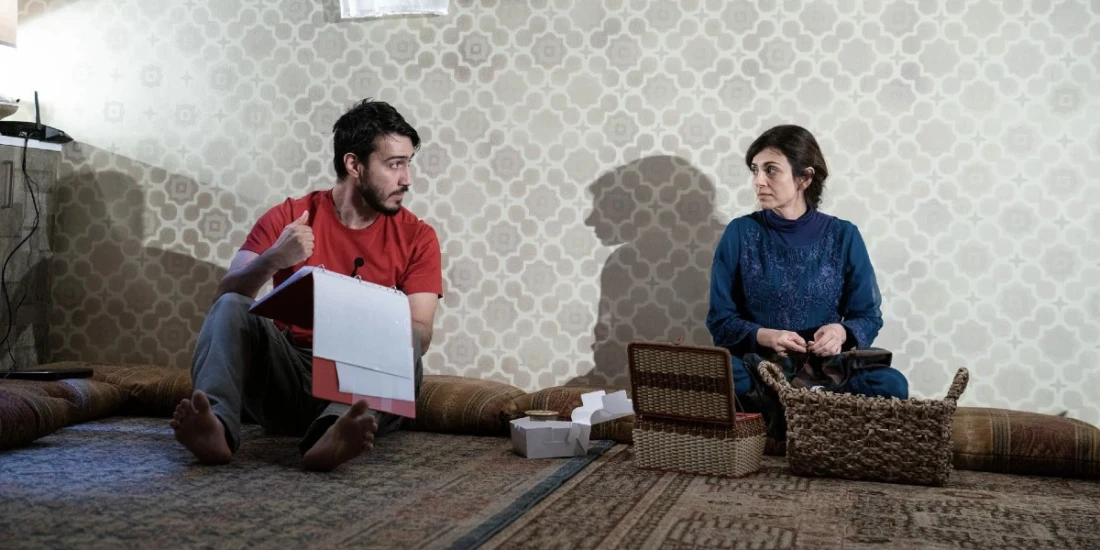'Selling Kabul' review — unrelenting tension muddies the play's 'compelling' emotional core
What happened to the citizens of Afghanistan after the United States military withdrew its forces in 2013 ― especially those who assisted the former occupiers?
In Selling Kabul, which just opened at Playwrights Horizons in Manhattan, Sylvia Khoury answers that question and many others by focusing on how the Taliban swooped into the empty power void to claim control and eradicate anyone who aided the enemy. Khoury accomplishes this by presenting the struggle between two small families as a proxy for their ruptured nation.
Kabul opens with Taroon (Dario Ladani Sanchez), a former interpreter for the U.S. military, ambling restlessly about an apartment until the sound of someone at the door sends him hiding inside a closet. He relaxes after his sister Afiya (Marjan Neshat) signals that it is just her. Afiya cares for her brother, but it is clear that she and her husband, Jawid (Mattico David), are at their wits' end from the stress of hiding him from the Taliban within their two-room home.
Against Afiya's advice, Taroon plans to visit his wife, who has just given birth to their son, even though doing so will likely result in their entire family being killed. He returns to hiding after a nosy family friend, Leyla (Francis Benhamou), comes visiting. Leyla repeatedly inquires after Taroon's location, even after a wary Jawid arrives home and makes clear that she has overstayed her welcome. From here, Kabul's already combustible stakes begin to explode with revelations about a murder, a mob attack, betrayals, blackmail, kidnapping, and a hastily arranged mission to evacuate Taroon before he gets everyone killed.
Director Tyne Rafaeli keeps the action roaring at a fever pitch, to the point that Kabul's inherent tension becomes exhausting. For instance, Sanchez has been directed to make Taroon's demands that his desires be prioritized so rabidly intense that I began to wish the Taliban would actually get rid of him so his family could find peace. Because of his careless behavior and many tantrums, one forgets that he is supposed to be hiding.
The refusal to honor this conceit is matched by Neshat's unmodulated performance, which is so high-strung that it is difficult to differentiate between her moments of annoyance and loss of control. When the phone suddenly rings, Taroon states that he is startled by Afiya's reaction ― but because Neshat reacts to every provocation as if the world were about to implode, the sui generis upset of this moment hardly registers.
One could argue that Sanchez and Neshat are simply responding to the impossible stakes that bedevil their characters ― but even in circumstances as extraordinary as these, the audience must have a sense of how Kabul's ordinary world might look. Otherwise it is impossible to contrast up from down, and we will grow numb in the wash of chaotic storytelling.
Luckily, the essential scaling of regular life slipping into manageable disaster followed by suffocation was manifested through Benhamou's portrayal of Leyla as a busybody with a clear agenda that goes ballistic once thwarted, as well as David's Jawid. His performance negotiated between, and often lost to, ever-ascending levels of turmoil ― as if he were bartering for a toe in an attempt to avoid sacrificing his entire arm.
It is in these moments that Khoury's message rings out clearly: The United States has forced Afghanistan's citizens to ration off pieces of their souls in the hope of remaining intact, if not demoralized. It's a compelling point that has been passionately written, though as of yet, this production has not brought that truth home. I believe that it will get there before it closes on December 23. But even if Selling Kabul remains busy and unbalanced, I think it is important to take in this show ― if only to remind ourselves what happens when our country plays chess with and abandons another country.
Photo credit: Dario Ladani Sanchez as Taroon and Marjan Neshat as Afiya in Selling Kabul. (Photo by Joan Marcus)
Originally published on
